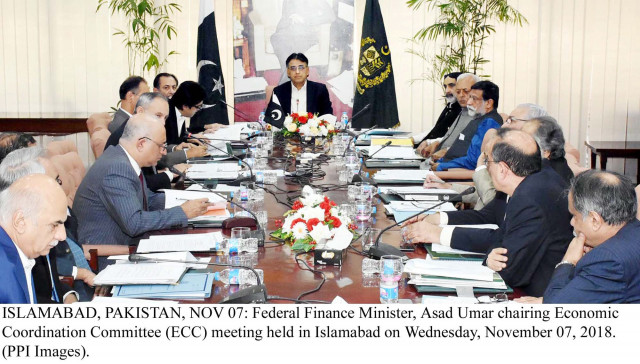ECC keeps wheat support prices unchanged despite farmers earning low profits
Committee also allows import of 50,000 tons of urea fertiliser to meet requirements in Rabi season

Committee also allows import of 50,000 tons of urea fertiliser to meet requirements in Rabi season. PHOTO: PPI
The Economic Coordination Committee (ECC) of the cabinet decided to leave the wheat support price unchanged on the recommendations of four provinces.
Despite a dire state of financial affairs in Pakistan State Oil (PSO), the ECC also did not bail out the oil marketing giant whose circular debt had touched Rs323.3 billion, threatening fuel supplies across the country.
Finance Minister Asad Umar chaired the ECC meeting. Farmers were provided with a Rs100-per-40kg increase in the support price in fiscal year 2013-14.
The Pakistan Tehreek-e-Insaf (PTI) government did not change the support price despite being aware that the cost of production of 40kg of wheat was Rs1,284 in Punjab and Rs1,271 in Sindh. The production cost was estimated by the provincial governments. That meant a farmer in Punjab was earning a slim 1.2% profit and in Sindh, he was earning just 2.2%.
Usually, small farmers receive prices that are even lower than the support price.
The extremely slim profit margins come at a time when inflation has already touched a four-year high.
The four provinces recommended keeping the prices unchanged, said National Food Security and Research Secretary Dr Hashim Popalzai. He added that there was already a mismatch between the local and international prices as the commodity was sold at Rs1,000 per 40kg in the international market.
"The price of Rs1,284 is on the higher side and that includes the cost of rent estimated at 40% of the total cost," Popalzai pointed out.
Last year, Pakistan produced 25.5 million tons of wheat which was well above its requirement.
PSO's financial crunch
The ECC remained unmoved on a summary presented by the Ministry of Planning to resolve the issue of Rs323.3 billion worth of receivables of PSO. It directed the Ministry of Energy to hold consultations with all stakeholders to find a solution to the problem.
It ordered the Power Division to actively engage with the companies concerned to facilitate the clearance of PSO's outstanding receivables as early as possible to avert any risk of disruption in the supply chain of petroleum products and energy supply, according to a finance ministry statement.
The finance minister told the ECC that PSO's financial woes may start easing after December this year.
ECC puts off power tariff increase for two weeks
The planning secretary informed the ECC that in order to ensure future supplies of fuel oil to the power plants, the Power Division should meet its earlier commitment of providing Rs50 billion to PSO.
It also recommended that in order to ensure fuel supplies for the next three months, PSO required Rs83 billion immediately and "the Power Division should provide at least Rs55 billion."
In addition to this, the government has not been able to honour its commitment of making timely payments on PSO's behalf, which caused losses of Rs16 billion.
The ECC was further informed that the power plants owed nearly Rs280 billion to PSO. Similarly, Sui Northern Gas Pipelines Limited did not pay its share of Rs20 billion to PSO on account of LNG supplies. Pakistan International Airlines owed Rs17 billion to PSO.
The committee approved the proposal of the Privatisation Division for the disbursement of Rs367 million as one-month salary (September 2018) to the employees of Pakistan Steel Mills (PSM).
Furthermore, the ECC directed the Ministry of Industries to take immediate action for the disbursement of dues to the widows of PSM's deceased employees which had been pending for almost four years.
The ECC emphasised that since PSM had been excluded from the privatisation list, the Ministry of Industries should, on priority, submit a detailed proposal to the ECC for PSM's operationalisation.
It also allowed the import of 50,000 tons of urea in a bid to meet the requirement of farmers in the Rabi season 2018-19. The committee authorised the adviser to prime minister on commerce to allow the import of an additional quantity of 50,000 tons, if required.
The ECC ordered that fertiliser plants may be kept fully operational for the entire Rabi season for adequate production of urea and to prevent its shortage. The committee maintained that no undue increase in urea prices would be tolerated on the pretext of increase in gas prices.
Additionally, the ECC approved the proposal of the Ministry of Food Security for enhancing Pakistan's share of wheat in the Saarc Food Bank Reserve from 40,000 tons to 80,000 tons, adjusting it in the existing quantum of one million tons of national strategic reserves assigned to Passco.
The Federal Board of Revenue (FBR) chairman briefed the meeting on tax collection from the sugar industry. He suggested that a revised mechanism be put in place to ensure that all due taxes were recovered from the industry. The ECC directed the FBR to place the matter before the cabinet after consulting the stakeholders within one week.


















COMMENTS
Comments are moderated and generally will be posted if they are on-topic and not abusive.
For more information, please see our Comments FAQ